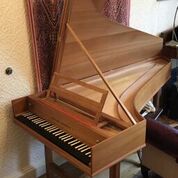Surviving the music exam - a teacher goes through the mill! RSS

I took Grade 8 ABRSM on the harpsichord recently. I have to say that this was one of the best decisions I have recently made as a teacher - it is so worthwhile to get down there and actually, personally, go through the entire process that we expect our students to master. It's been sixteen years since I last took an instrumental exam (the ABRSM Advanced Certificate, now superseded by the DipABRSM), and I have not really regarded myself as a performer since then. But when I took up the harpsichord two years ago and began taking lessons I realised that an exam would be a useful milestone to aim for, along with participating in a short course at Benslow Music Trust and attending the wonderful Piano Summer School at Chethams music school, where there is a harpsichord course in the margins.
Just another keyboard (no!)
By the way - for all those pianists out there who are thinking that playing the harpsichord can't be that different from the piano - let me tell you that correct harpsichord technique is almost the polar opposite of what we do on the piano. Whereas the pianist uses years of training to launch the hammer "just so" to make the best possible start to the sound, all a harpsichordist can do at the beginning of a note is make it sound right or wrong. The plectrum plucks and the string vibrates just the same whenever you press down a key (and you can directly feel the pluck, which is another difference with piano technique), but if you get that finger movement wrong you will cause extra banging sounds that spoil the tone. No, the harpsichordist's main focus is on how long to make each note last, so that the blend of sounds, the implied accents and phrase shaping, and the separation of contrapuntal lines are all optimised. The moment of releasing the note is where the difference can be made. There is almost infinite choice and it happens in the absence of any other method of dynamic shading. So it really matters. Remember this if you ever get a chance to play a harpsichord: approach with a very light touch (JS Bach had a greatly admired technique: it was reportedly almost impossible to see that his fingers were moving - a far cry indeed from arm weight and wrist flexibility), a very attentive ear, and all due humility!

The road to the exam room
So about a year ago I selected three pieces to learn and started practising in earnest. I was a bit distracted by learning separate repertoire for Benslow in May - a new Prelude and Fugue from the 48, which took me far more effort than I expected - and for about six months it seemed as though all I was doing was fingering, re-fingering and note-slogging for page after page.
I had the useful intermediate (August) deadline of the Summer School, at which I aimed to play all three of my pieces to a level at which the tutor could make a difference - unpolished but recognisable, and without ingrained habits that might hinder any reworking of interpretation or technique.
Almost all my learning was done on my Roland digital harpsichord, which I replaced with a "real" one I purchased about six weeks before the exam. This caused an interesting dilemma: I had chosen one piece that required a double manual instrument (which in this case could have been acceptably faked on a digital) whereas my new pride and joy has only one manual. In the end I took a risk and started on a new piece despite the lack of time... I chose carefully and worked very hard, using all the note learning and practising skills I had been accumulating all year!
How did my exam go? I think it was a fair reflection of what I was capable of that day, but more importantly, I played no better or worse than I have on any other day before or since, so my preparation both technically and mentally seems to have paid off. This is not to say that people can avoid disaster striking in exams, but I do believe that many of the poor outcomes we regrettably do see are both predictable and, if the will is there, avoidable. However, as teachers all we can do is lead the horse to water. Whether or how much it drinks is up to the horse. As long as we provide the pupil with organised instruction and clear practice methods to take home, their lack of practice and hence progress cannot be blamed on us. Motivation is quite another matter, of course.

What did I gain?
Now that the exam is behind me, I can reflect on what happened and the learning I have acquired. As I write this, I have not had a mark or comments, so I can still focus on the process and experience, untainted by the cold numbers of the mark scheme.
Learning about learning, not only teaching
I was teaching two grade 8 piano candidates for the same deadline, so the first thing I noticed was a strong sense of empathy, of working in parallel with them towards the same standard on the same date. It made my instructions and advice to them all the more rooted in my own practising and discoveries about what works and what is wasteful. As I'm no musical genius I could also share their struggles with, for example, the aural tests, and work out with them how best to manage their techniques for answering the questions. It's all very well explaining how I do something like singing back a melody, but one of my students simply doesn't do it that way and I could not find a way to see into her musical memory and enhance it! I think they enjoyed the sense of their teacher being also a colleague on the same mission.
Don't neglect the supporting tests. Being a piano teacher who (at music college) used to warm up with an hour of interesting ways to play scales and arpeggios in all keys, that part of the exam was not an issue for me. Sight reading, however, has always been a weakness and I have developed novel ways to deal with this, which I will share in a future article. Hope cannot cure poor sight reading: doing lots of easy, progressively harder, sight reading every day will cause actual improvement. This is a job for the steel-eyed taskmaster in you and your student - you (they) will naturally want to avoid the unpleasant stuff and you/they will tend to have "no time" to fit it into the practice schedule. This is normal, but it is also the ostrich position and will help nobody. And my goodness, I had to work on my figured bass! Early, realistic and structured work were vital, as was perseverance to the very last. My main method for holding myself to account was a simple set of columns and rows drawn on a sheet of A4: the columns were all the exam components and the rows were days. At the end of my practice time I would jot down what I had covered (Tuesday 8th: Froberger - bars 41-52; figured bass - 4 3 suspensions, etc) If I left a column blank for too many days it was glaringly obvious that I was neglecting something and I knew that was the opposite of progress.
Practical plans
The need to be organised well in advance became very clear when I broke down the tasks into timed targets, such as labelling each line of a new piece with a due date for fingering and note learning. With hindsight I shall certainly do some things differently with future exam candidates - in particular I shall insist on laying very solid foundations. I know, it sounds so obvious, and who would admit to building on soggy ground? But we all like to play lots of notes as soon as possible, particularly if we love the piece. We must find a balance between killing the joy of the music (by only ever doing rigorous slog) and failing to learn the notes reliably (by basically sight reading over and over). The 18th century composer and teacher F Couperin, who admittedly had the luxury of giving daily lessons to his students, actually forbade them to practise in his absence, and would resort to locking their instrument and taking away the key, so that they could not undo the progress made in the lesson!
You can only work with the grain of your learning style, but you can and should push yourself in the direction of doing better wherever your conscience challenges you. For younger students this translates into the teacher setting very clear and achievable tasks which have already been securely tried out in the lesson. Practising is then a manageable consolidation rather than a scary leap in the dark. "Learn the RH up to bar 8" is an empty suggestion if those bars have not been explored in the lesson, and all the notational details pointed out, and possibly the whole lot learned by ear or from improvisation using "ingredients" in the style of Paul Harris.
The uneven task of improvement
Since some bars are always harder than others, the default method for me is to work really hard on the hardest bars I have identified and skate past whole phrases and sections that are giving less trouble. This approach does come back to bite later, but there are only so many minutes in a practice session. Towards the time of the exam I needed to go back over quite a lot of the more neglected music and do "proper" practice on it. This is something I've seen in many students too, and if at all possible it's better to steer them into a habit of properly nailing down all their fingerings, leaps, position shifts and pattern changes at the earliest stages of learning.
After all, what you play in the practice session is what you are establishing for the performance, right? A little hesitation that "always" gets in the way of a smooth pattern change is not going to magically disappear in the exam room, is it? So why not sort it out now? This is where the teacher can make a difference by encouraging the student over the real psychological problem of cutting the music up into ungainly (and probably unmusical) sections that cross natural boundaries, and then pushing through into fluency.

Shaping the music
Putting life into the well-learned notes is not just for the final month. As some of my more struggling early-grades candidates neared their exam and the notes were at last playing in the right order and timing, I realised that we had now cemented a set of habits that would be hard to alter in any way, including any attempt to improve dynamics, articulation and phrasing. Again, I know nobody sets out to ignore half of what's printed in the score, but when even the pitches and fingerings are a battle there is a temptation to over-simplify. In future, I am going to be more definite, and earlier, in my requirement for more of the details to be part of what is being learned. Not just "It's your fourth finger on F sharp" but "and you must play it gently".
Wrong notes!
Performance problems began to rear their head as exam day approached. Again, this enhanced my teaching as I needed to instruct myself. Various books on practising and the excellent website "The Bulletproof Musician" came to my rescue, and I learned afresh how to make that final approach to the Big Moment and land safely, if not entirely tidily.
Much good stuff has been written about overcoming performance anxiety, and I would urge you to go and read it, but for me the solid fact is that you will play wrong notes and they will only matter if you let them. One of my grade 8 students played in a concert the week before the exam, and I was able to assure him that his performance was outstanding, when all he could remember was one particular moment's hesitation following a mis-hit during an otherwise fantastic interpretation. Everybody listening just wants the music to go on... especially if it's going well.
A memorable quote I found very useful around this time, apparently of US Navy SEAL origin, is (if I recall it right):
When you are under pressure, you do not rise to the occasion; you sink to the level of your training.
For musicians this emphasises the need to drill those notes and fingerings, place those accents and dynamics consistently, and make the music as familiar as the road home. During my exam I actually had to tell myself a couple of times to trust my fingers, as I was starting to do that adrenaline-fuelled overthinking that can turn music into mince. There is no getting away from the reality of distraction, error and the unexpected, which make it all so different from what happens in the practice room. This is why in the run-up to an exam it is vital to put yourself into the performing mode as often as possible. Once you have run out of patient friends or admiring relatives to provide audiences, switch on your phone to video or even just to make a voice recording, and make yourself play the piece all the way through with that single-take pressure. And every day, when you sit down at the instrument, decide before you play whether you are going to do a performance or a diagnostic run-through. The two are very different.
Know your mind
When you perform, the "Inner Game" is always on - that battle among your live thinking processes that can cause anything from amazing flow to a distraction that can stop the music - and it's well worth knowing about it, because I doubt you can sidestep it entirely. The best compromise is to play that game with understanding and know your own tactics for keeping the music going. I believe the first Inner Game book was about tennis (do check out the one about music), and certainly watching Andy Murray over the years has shown just how much of that sport is mental. Noa Kageyama (the Bulletproof Musician writer) uses a lot of sport-related research that reads usefully across into music performance.
Know your music
Beware of practising that enables you to get it right second time! You only get one shot in the exam, so as the day approaches, more and more effort must go into playing with intense focus and an ability to pick up from almost any note. Back in the early to middle days of preparing, I adopted a practice method of noting (at the top of the page itself) bar numbers of everything that needed attention, and going straight there when I opened the page. This had the useful side effect of later enabling me to start in numerous places and jump around in the music, which is essential in keeping going through crumbly moments.
As I learned and practised my pieces, I used my pencil and eraser a lot more than I expected: lots and lots of fingering, circles, annotations and thoughts, which I would erase once they had become invisible through familiarity. In the week before the exam, the final polishing included writing the word "HERE" or "THIS" where mistakes and problems still persisted, working on them diligently and then rubbing the word out so that it would not remind me to fear those moments in the exam. The "nightmare bar" is a real feature of many works and once you have wrestled with it enough, letting go of the fear is almost more difficult than getting through the bar.
Know your limits
The week before my exam, my teacher came to my house to meet the new harpsichord and advise me on how to get the best sound in that room, with that instrument, on the day. After about two hours of fairly intensive work on all aspects of the exam, we turned to my third piece, a glorious Bach English Suite prelude which in my darker moments I have summed up as "six pages of semiquavers" (which is actually true). I started playing. It began to unravel on page two, and by the middle of page three I stopped, so disconcerted by my inability to keep it going that I abandoned the performance. My teacher, knowing just how much preparation had gone into this, wisely diagnosed mental exhaustion and advised me to play the pieces first in the exam to ensure a fresh mind. I found this reassuring and played the same piece rather well to a friend the next day, undoing any sense of foreboding.
Find the joy
Again - I cannot say this enough - understand that your performance will not be flawless. Your goals are knowing how to keep the music going and (equal first in importance) how to keep projecting the message of the composer and your own way of expressing total agreement with it. I must say, my happiest memories of the exam were all those moments where I was aware of my love of the music I was playing, and my wish to communicate that, pulling me up above the handfuls of wrong notes and showing me the whole point of what I was doing. That, and the moment of sheer triumph when the nightmare bar bowed its head as I swept through... none of which I could allow to draw away my focus from the next phrase, and the structure I was holding and building with both hands in real time. Truly, performance is an altered state of consciousness.

The result
As luck would have it, there were problems getting my result for the exam and it was delayed. Eventually, the “raw” marks came through online, which gave me the shock of the numbers without the comments to explain them. As the mark was at the very lowest end of what I expected, I was perturbed by this. There was then a frustrating delay while my mark sheet and certificate went missing, and a certain amount of time had to pass after that, before the examiner could be asked to rewrite the mark sheet. During that interval, I came to terms with the mark itself and continued to refocus on the teaching and learning benefits I had gained. But I have to admit it was quite a blow to my pride as a teacher that I did not get the Distinction I had hoped for. Mulling this over, I realised that Merit was actually the band I had been occupying all along, and the 124 which I was awarded, although on the low side, was not so much worse than the maybe 128 I might have got from a different examiner. There has to be something extra special about a Distinction level award, especially perhaps at grade 8, and it is important for examiners to guard the gates of that.